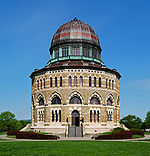Bridge 10, Erie Canal
Canadian Pacific Railway bridges in the United StatesErie CanalGirder bridges in the United StatesRailroad bridges in New York (state)Steel bridges in the United States ... and 2 more
Transportation buildings and structures in Schenectady County, New YorkTruss bridges in the United States
Excerpt from the Wikipedia article Bridge 10, Erie Canal (License: CC BY-SA 3.0, Authors). Bridge 10, Erie Canal
Geographical coordinates (GPS) Address Nearby Places
Show on map
 Continue reading on Wikipedia
Continue reading on Wikipedia
Show on map
Bridge 10, Erie Canal
ALCO Heritage Trail, City of Schenectady
Geographical coordinates (GPS) Address Nearby Places Show on map
Geographical coordinates (GPS)
| Latitude | Longitude |
|---|---|
| N 42.833888888889 ° | E -73.927777777778 ° |
Address
ALCO Heritage Trail
12345 City of Schenectady
New York, United States
Open on Google Maps





